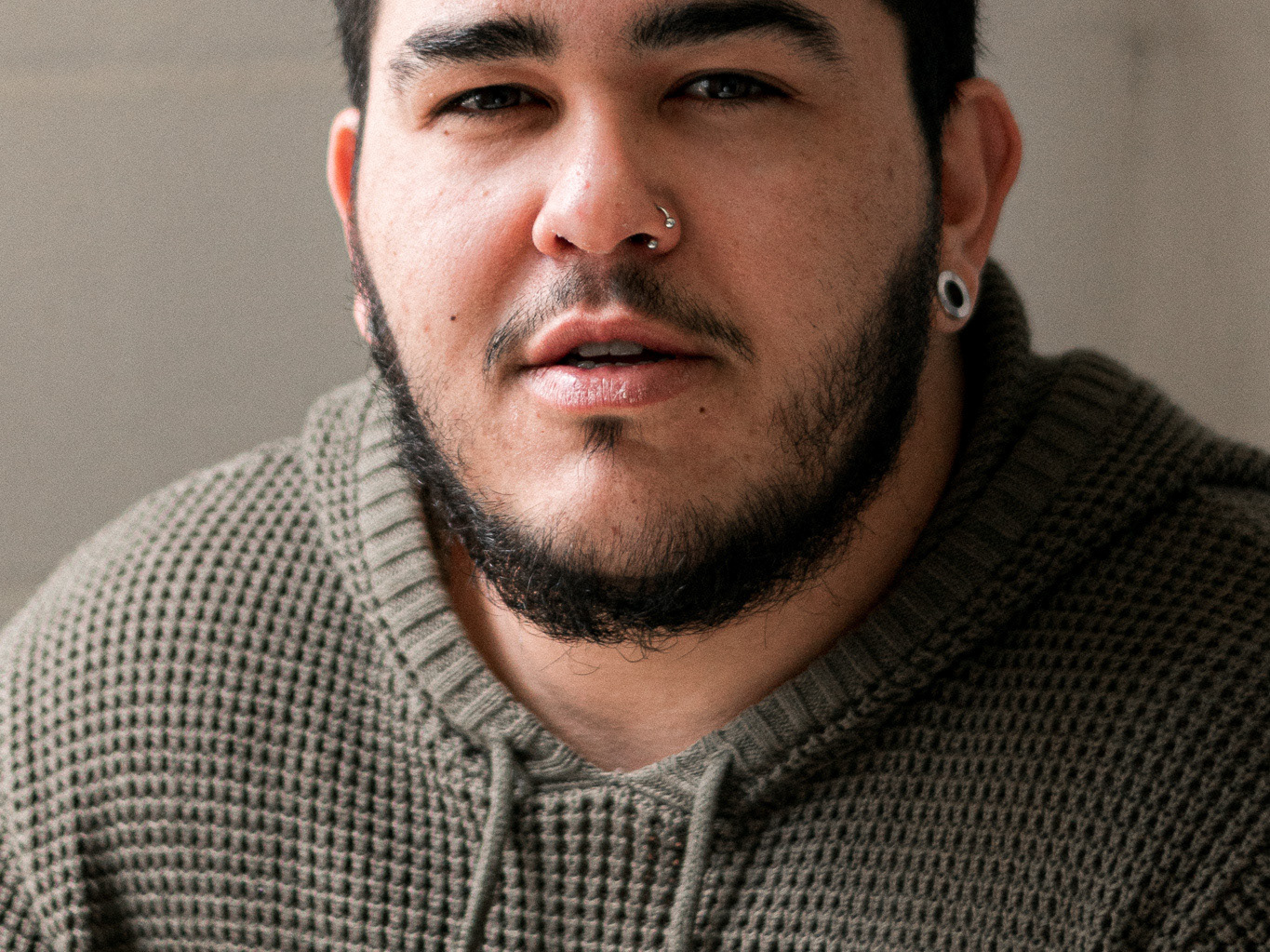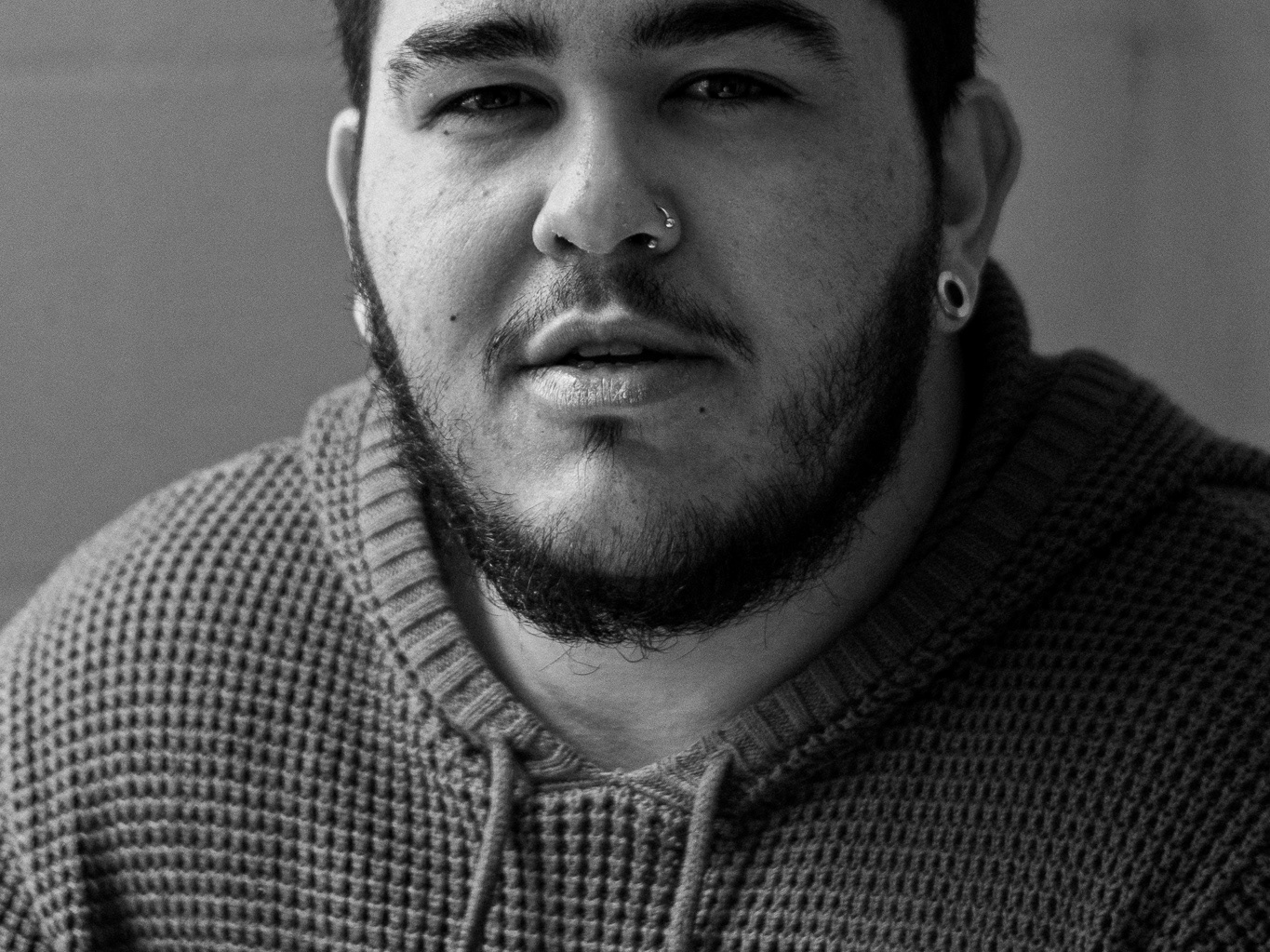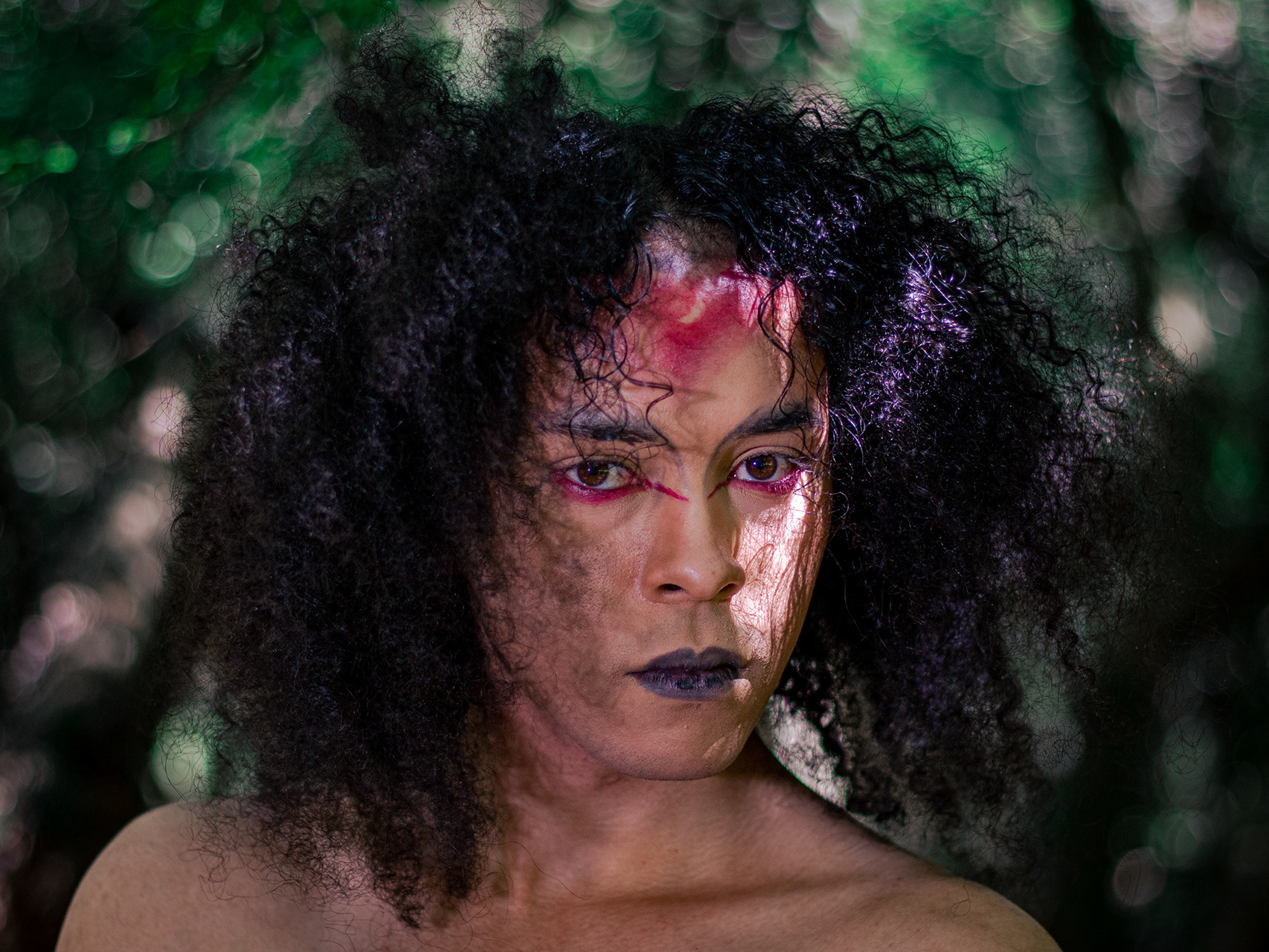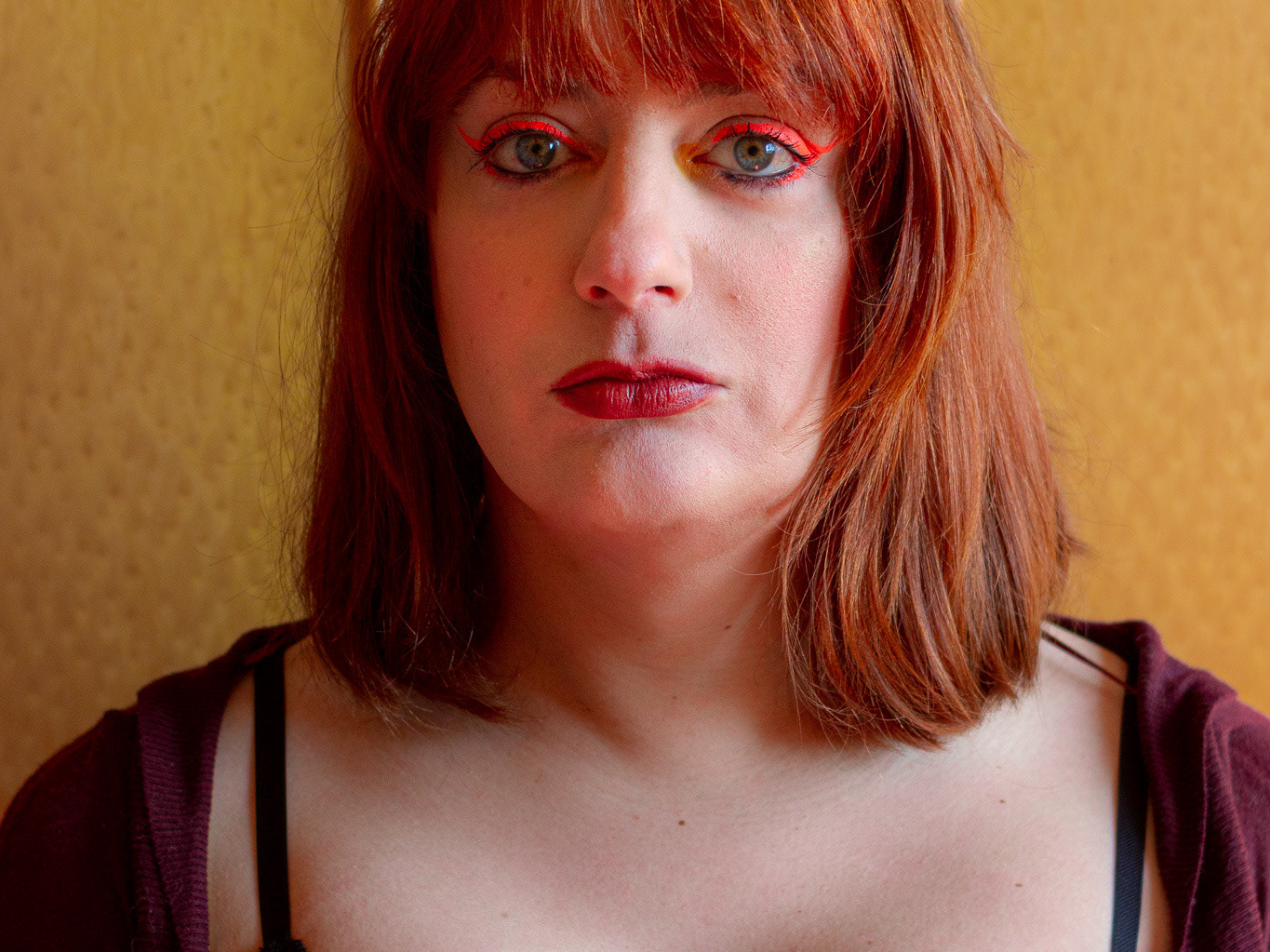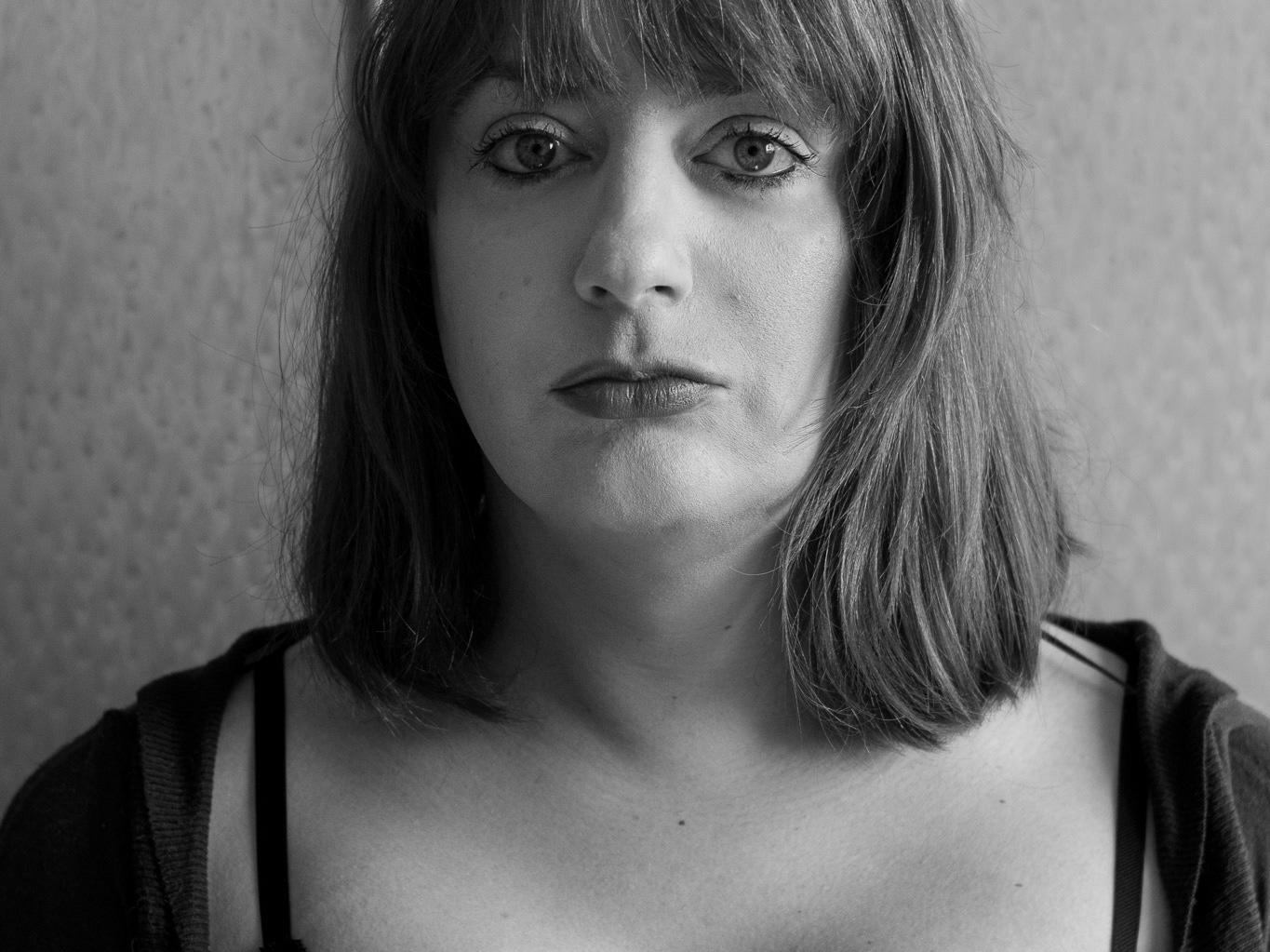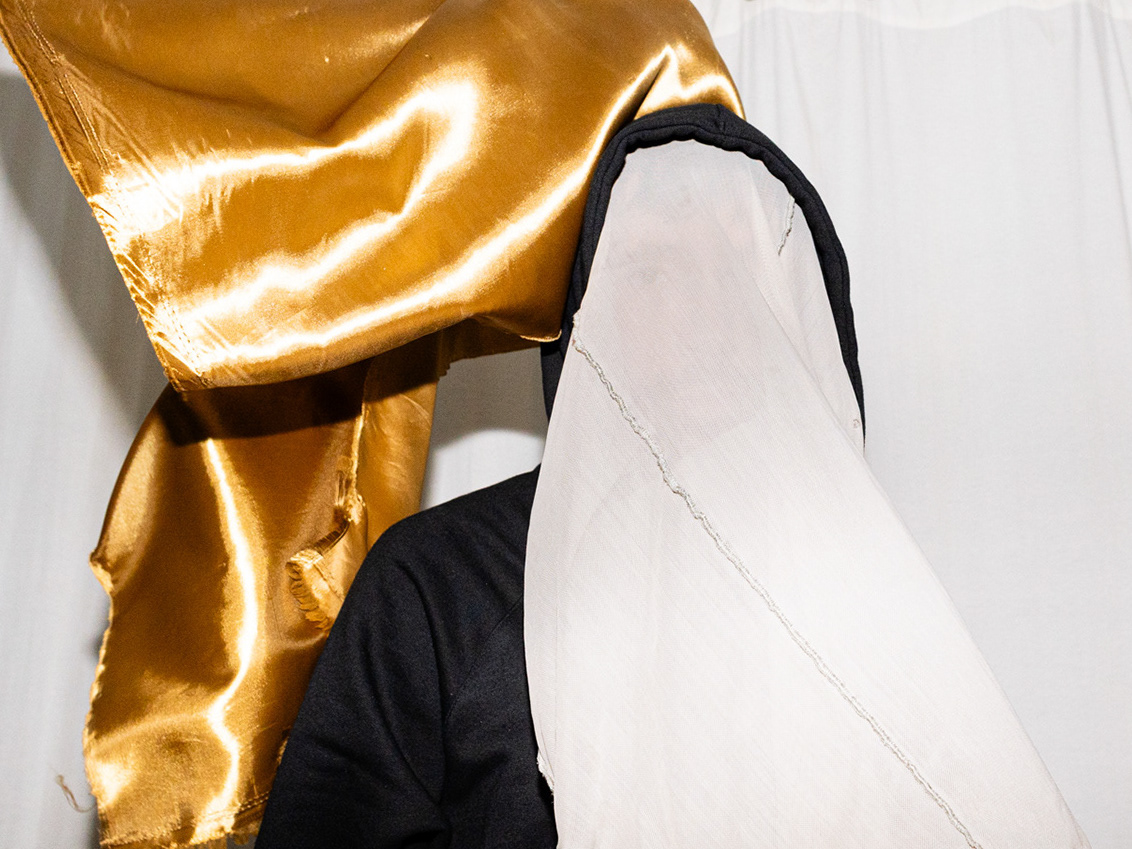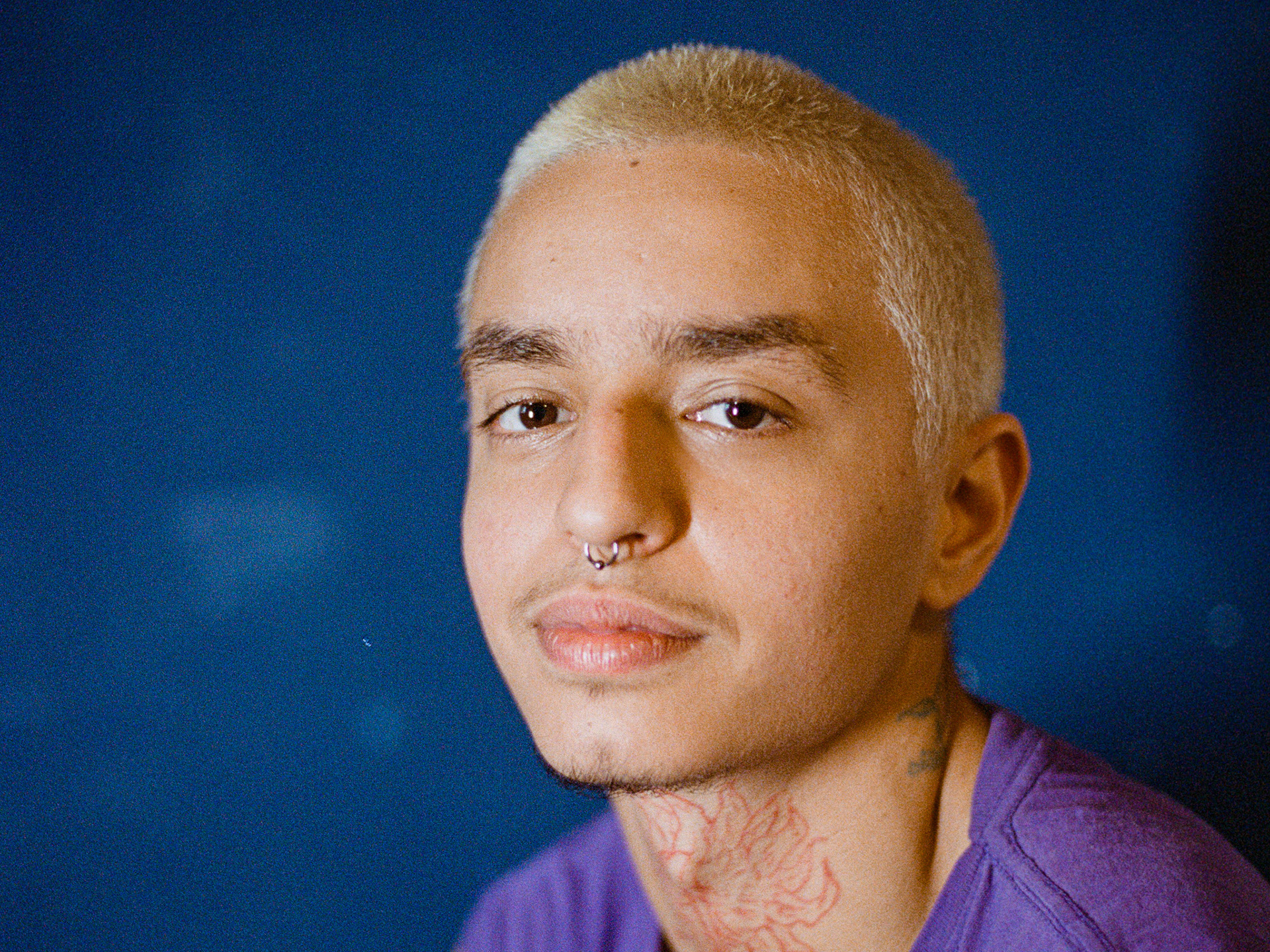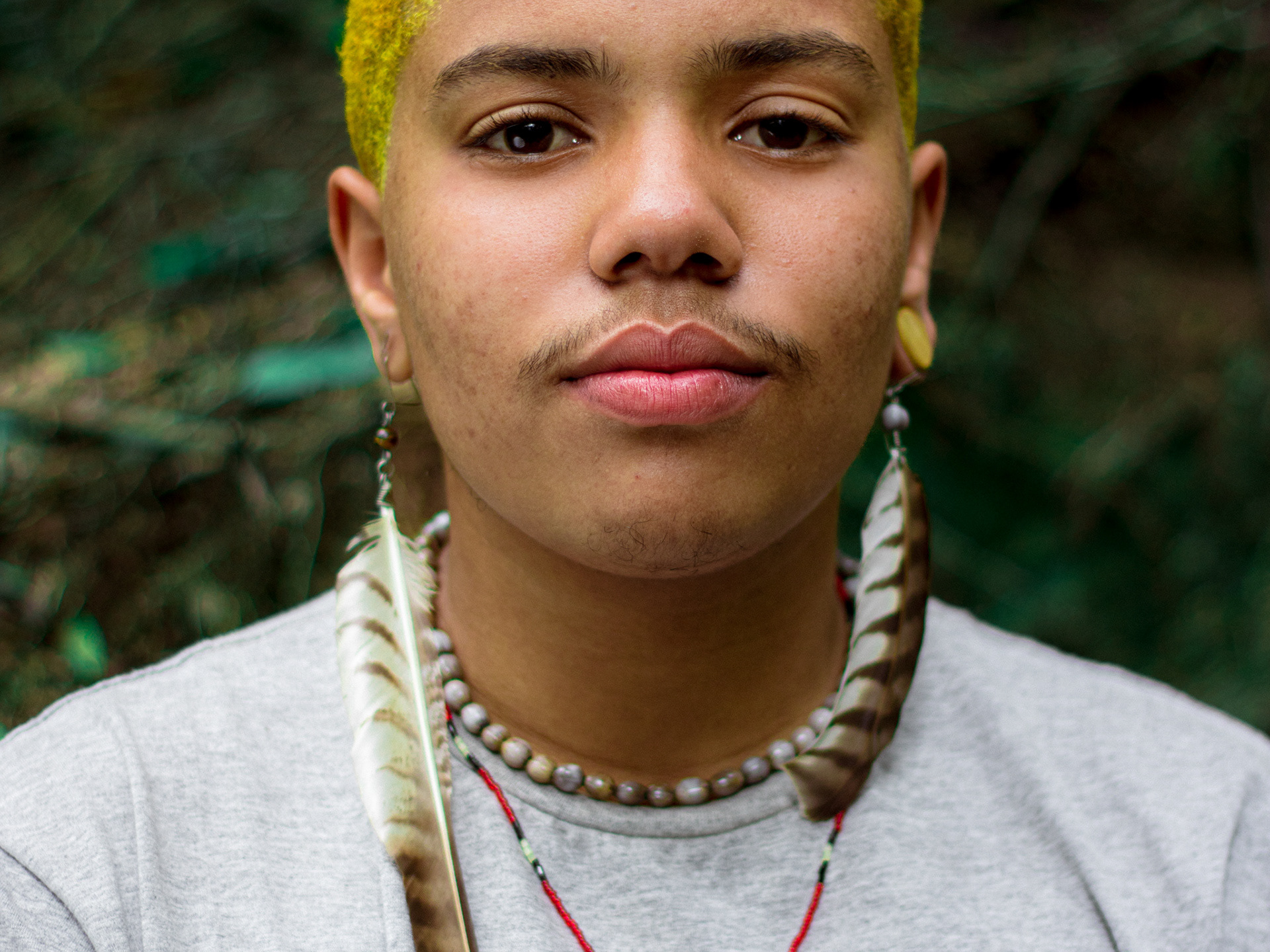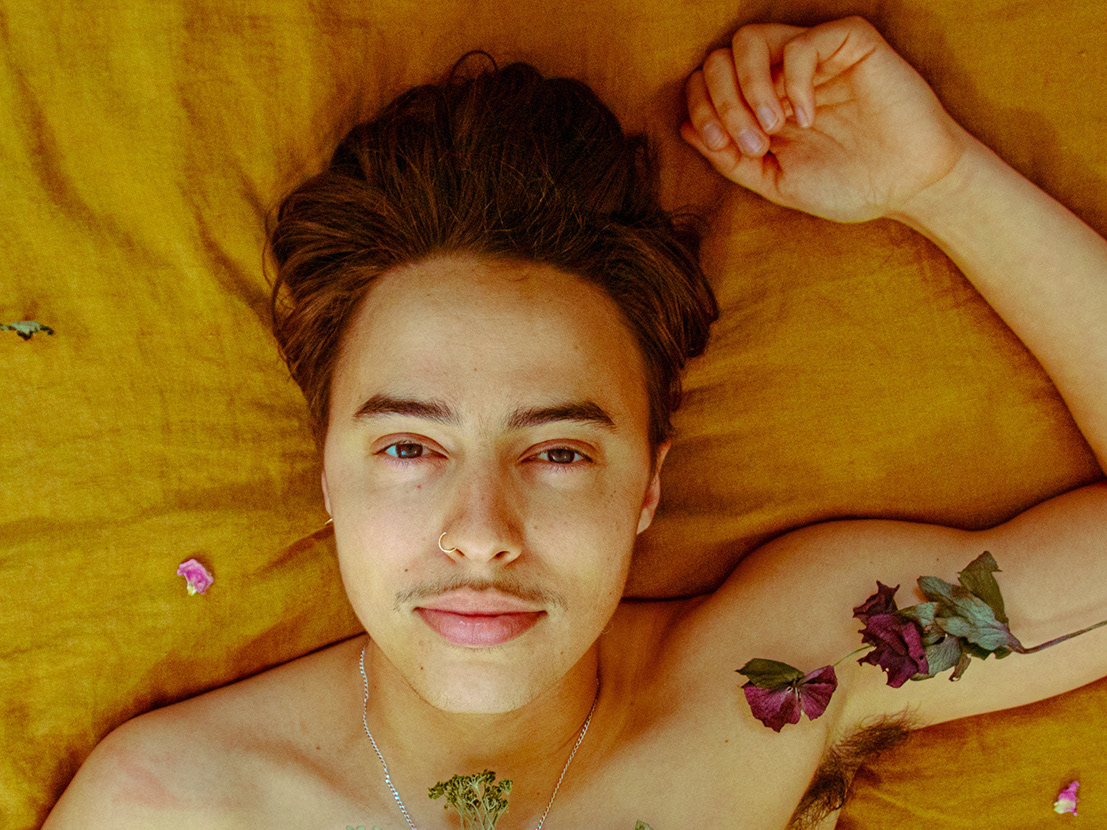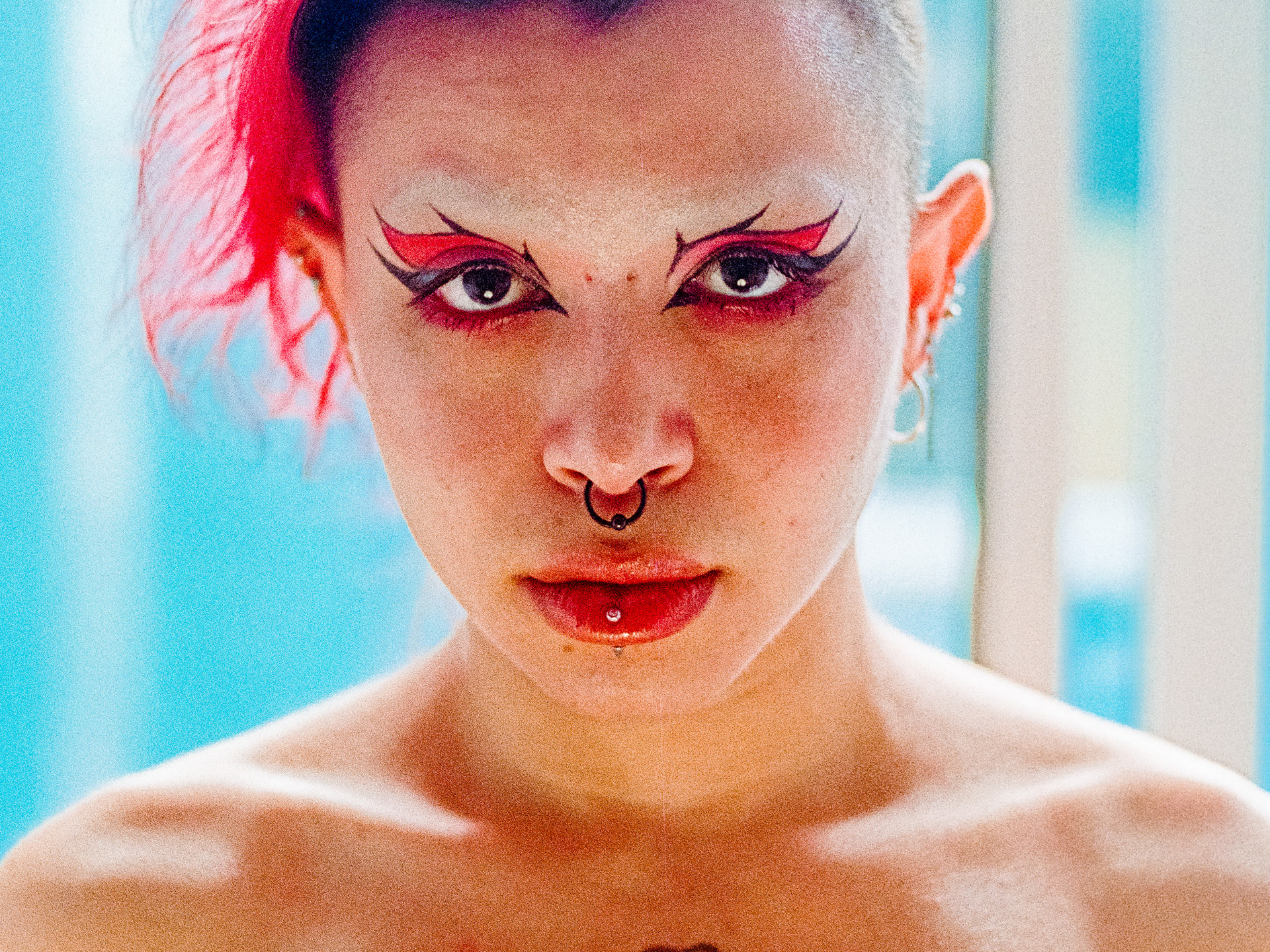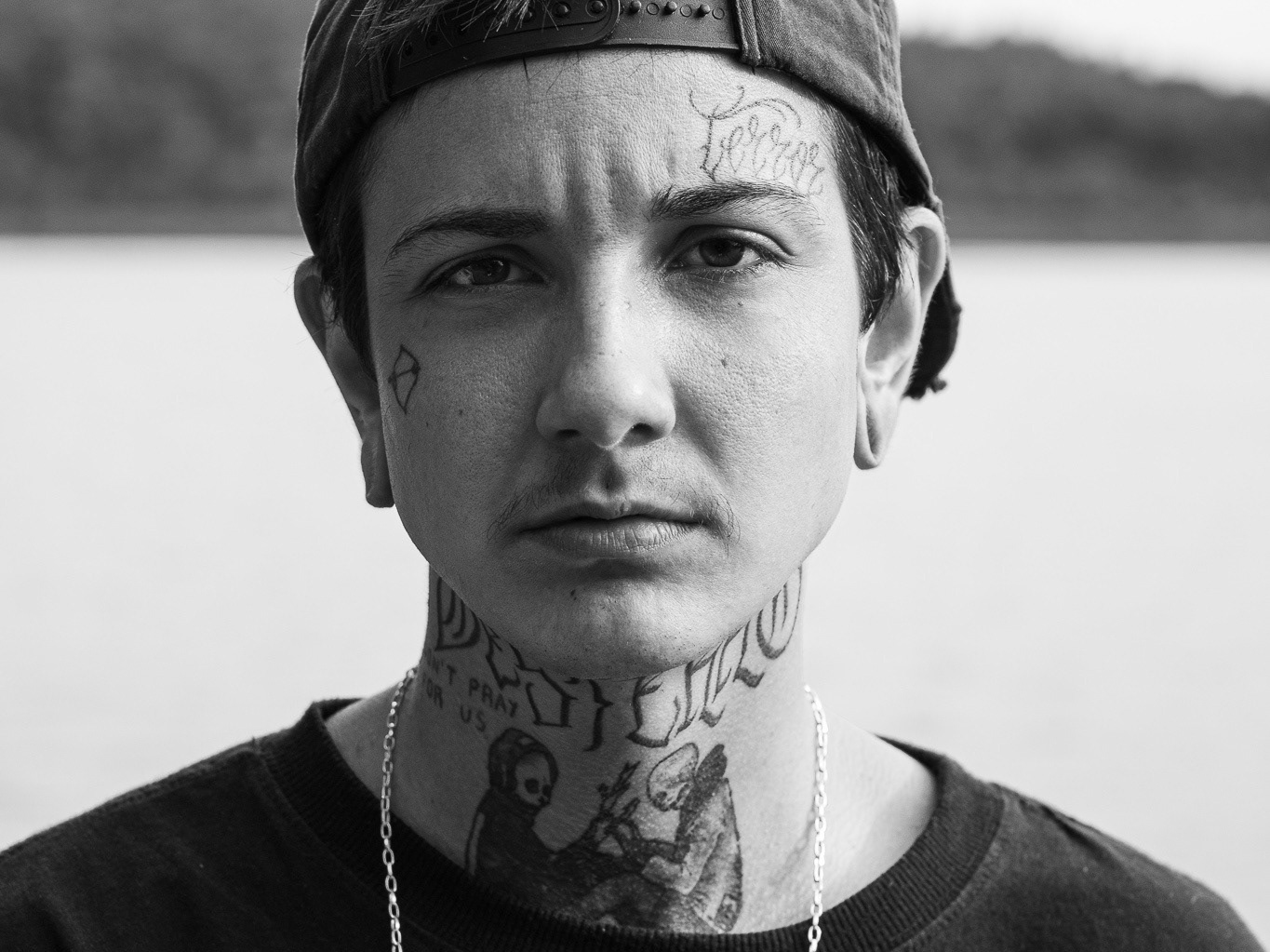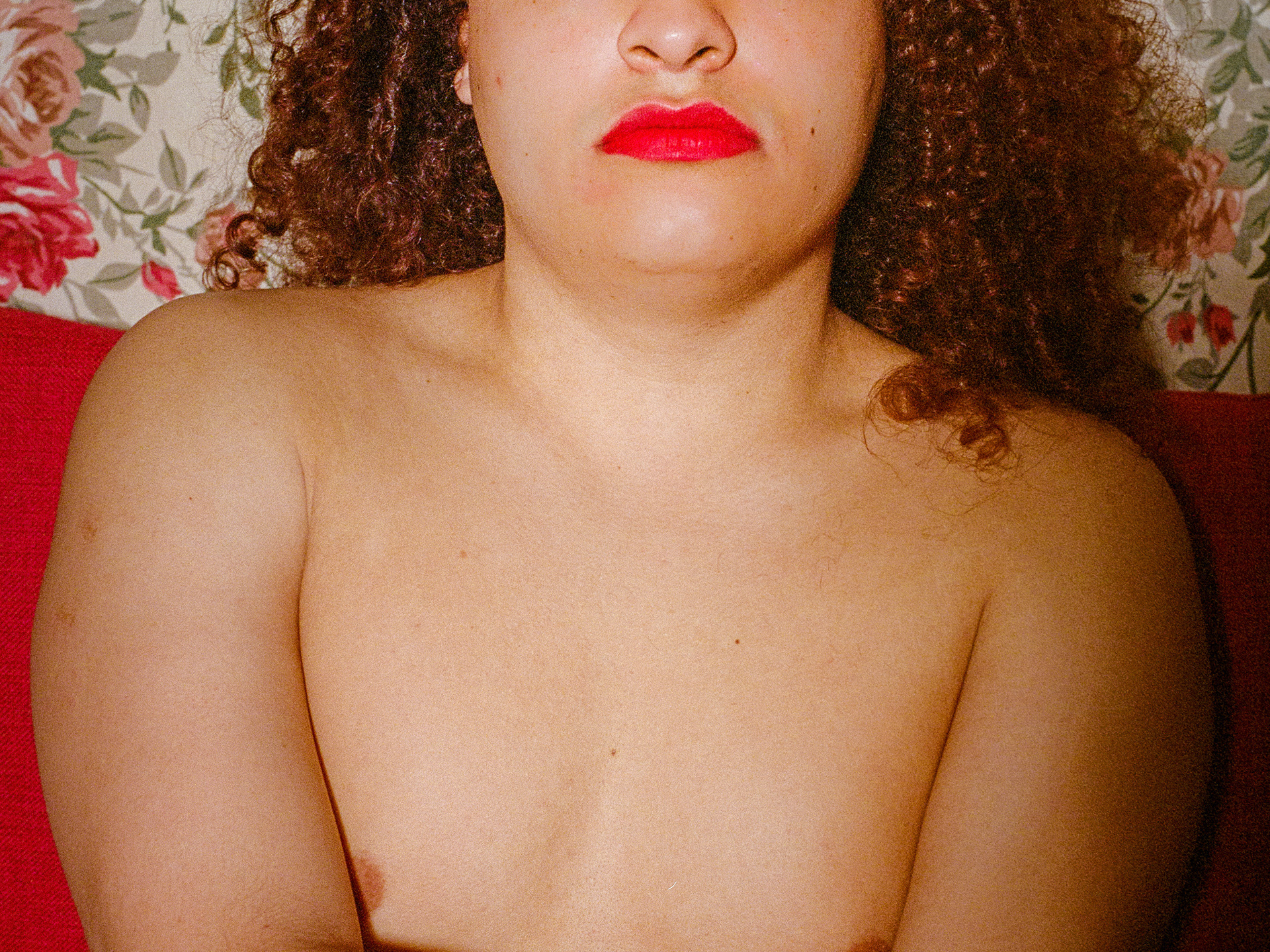Who I am and my processes... It's hard to disassociate, right? I'm Ávine, I'm 25 years old, I'm graduating in Architecture and Urbanism, I'm doing a postgraduate degree in Communication and Fashion Production. I think it's important to mention these things because we don't occupy these academic spaces much - I'm the only travesti in all the academic spaces I've occupied so far. So I think it's important to say that we are graduated travestis, occupying all the spaces that were denied to me since before my existence.
I'm from Minas Gerais, I grew up in a very religious city of 25 thousand inhabitants, and my parents are also very religious. At the age of 18 I moved to Belo Horizonte, where I did my university entrance exams and had contact with people who were different, like me; in the sense of not fitting a heterocisnormative norm. I didn't have many contacts with trans people yet - except in my city, where there were some travestis with whom I had contact. Anyway, leaving a city of 25 thousand inhabitants for a capital is always a "boom", to see yourself in some places and spaces, to feel a little welcomed there at that moment. In 2016 I moved to Viçosa, where I did my degree in Architecture, which later became distance learning due to Covid and then I moved to Bento Gonçalves, RS, in August of last year; But I started coming here months before, in April.
To be able to talk about my history and understand my processes, I'll tell you how this construction was of seeing myself in a country town as, before, a very effeminate fag - I use "faggot" because the term "gay" was still very connected to a kind of men that, at that time when I saw myself and identified myself as a fag, didn't fit me. I was very far from a masculine gender expression. So I say fag because fag is beyond being gay, right? It's a place of fight inside the G community. I've been through a lot since I was young, for not fitting this behavior pattern, for not being where society expected of me, of being a person who was designated male at birth - I didn't like to wear men's clothes, I always liked being among girls, and wearing women's clothes. Not that this is something that made it mandatory for me to be a travesti today, but it is something that has been part of my identity construction since I was young. It is also important to understand that the construction of Ávine as a travesti, went through a lot of pain, since I grew up in a very religious city, where I was pointed out as different and wrong by others, including my family. When I was forced to assume that I was a fag - because I didn't even had time to understand my sexuality very well, because, since I was effeminate and designated as a man, I was obligatorily a fag. I couldn't be asexual, bisexual. I had to be a fag. So I say that I was pushed into a closet that I didn't even know existed, I was just living my life. I heard things like: that God would condemn me, that I would go to hell - this coming from my family! For example, my father took away all my electronic devices, such as a laptop and phone, so I wouldn't have contact with anyone else! Because I couldn't, right, have that contact, I could find out who I was. Until we went through a family therapy process and managed to have as little dialogue as possible at home. Apart from all these psychological and even a bit of physical aggressions related to behavior, like I couldn't sit cross-legged, I had to sit with my legs open, I couldn't gesture while talking, anyway... As I say, this pruned the root of Ávine's growth, you know?
Ávine was officially exposed to the world in a process that began in 2019, when I started studying Vogue Femme after meeting some people of the Dance course of my university. Then I participated in a show called Malakoi, where we studied and performed Linn da Quebrada's album, telling a story of a person who deviates from the norm. At the time she launched this album, Linn saw herself as a fag travesti - and I was crazy about it, right? I was like "my god, fag travesti! What's it like to be a fag travesti?" I saw myself like that. Being a fag wasn't enough for me.
Then I had this contact with vogue femme, and from that contact I also had contact with Ballroom and, in the meantime, I told some people that I was a non-binary trans person. Then I had a conversation with my mother in 2020, I was already back home because of the pandemic. I showed a video of Linn with Pedro Bial and I explained some things to her. I told her something that she had already noticed and was just waiting for me to tell her; I went there and told. Okay, but she didn't understand very well what a non-binary person was, I kept trying to explain it, but I knew that it wasn't just that, you know? Until I understood myself as a travesti - not as a woman, not as a man, but as a travesti. This is very important: I understand being travesti as a third identity. It's a construction I went through. A construction of Ávine travesti, from where she mirrored the femininity she wanted to recreate for her. It's liberating to have an identity that doesn't mirror these binary extremes or cisgenderism - being a travesti, for me, is much more than that. So I went through this process of recognizing myself as a non-binary trans person, and then, as a travesti. Also, in a way, of being on the non-binary spectrum, since I don't put myself either as a man or a woman, but as a third identity, which is travesti. And it was very complicated at home, because I never expected anyone's approval to do things. My father is aligned with the Bolsonaro government, and, as I said, my process, from a young age, was violated because we had ideals that didn't match and I didn't back down. I wanted to live my life and my experiences, identities, expressions, and this did not always fit what they expected from having a boy child.
And then, when I came out as a travesti, one of the first things I heard was if I would prostitute myself to survive and how I would support myself; because apparently I was no longer a person who could be sustained in that house. My relationship with my father, which was already not good, got much worse. He doesn't accept very well that he has a daughter who is travesti, who imposes herself as a travesti - people are afraid to say "travesti", but I love to say that beautiful word, that Latin identity! I reviewed all the concepts of what family is after [meeting] the ballroom, because my House, which, within the ballroom culture, is my family, was what supported me, more than my blood family, who said it was with me. I could see that blood family didn't mean anything, like, family is what we build, who is on our side is who we adopt for us. My House was essential in all my processes. Seeing travestis in the ballroom, being with them, was essential for my processes. Well then, this is who I am. This is my painful construction, but with a happy ending and a lot of pride. Sometimes I think that if I hadn't gone through all the violence that I went through at home, social violence, physical violence, bullying at school, maybe Ávine, as I wanted to be, would have been born earlier, her construction would have come before. But... the way it happened was also beautiful; it wasn't, perhaps, how I wanted it to happen, but it happened in a way that brought me many good things, brought me many friends, brought me family, brought me my boyfriend... Anyway, it brought me myself, and that's a delight! Nothing better than living who I am.
Linn [da Quebrada] was essential to many things in my life and from her came other travestis who were even more essential for me to be alive, you know? I talk about travestis being my sisters without even knowing them, because we have each other. I don't know Linn, but I'm hers. It's like I was born from her. And there are others that are mine, because we are together, somehow. There are travestis that I've never seen in my life but with whom I exchange a lot, on the internet, for support... Also other trans people, non-binary, transmasculines. It's cool as fuck, very strong.
For me, being a travesti is running away from a femininity which is always mirrored in a white cisgender norm. I also think it's more about finding who I am; I wasn't born a cis woman, I was born a travesti. I hope all people have travesti daughters, too. Also, it's a Latin and political identity, and I've always been linked to the social movement - so I've always faced everything. And putting my identity in a political movement was embracing, because I am a political body. I make existence, I make historical landmarks wherever I go. As I said, I'm the only one, not only in college, but in several places where I go. So, being a travesti, besides being a Latin identity, which is ours, it's an identity that came before trans women and was not sanitized, it was what really opened the doors to the whole community. It's the identity that was on the front lines. It's being a political body, as Linn says "it's not son, it's not daughter, it's flaw", it's gender flaw. It is a rupture that no one expects, but that is there, existing and coexisting and will prosper, you know? So for me, wow! It's very strong. To identify as a travesti... It's a delight to be a travesti: there are loves and pains, but the loves are like... Much superior!
About being the only person in many places I occupy, to be honest, sometimes it's a bit of a burden to be the first to open doors. I wanted to walk just with travestis so that we could open doors together. But I know that we always make history because there were those that opened before me and I'm taking the doors with them to open for the next ones that are coming. Being the first travesti in my course, in my department, generated an earthquake there. Even though it is an architecture department, it is still very rigid, focused on exact sciences, engineering... So, there are some people who have a more progressist mind, but there are more conservative people, including the professors. One of the things that stuck me a lot... The only thing left for me to graduate is my final paper. I just have to make my defense. In architecture there are two defenses. My first [thesis] advisor was a bolsominion [supporter of Bolsonaro], it was complicated. Then I changed my advisor, but the examination board treated me with masculine pronouns. This caused me some trauma that made me feel a little stuck, to deal with it. Because not even in a higher education academic institution, where people have gone through a master's and doctorate, do they have the minimum of study or cognitive capacity to welcome or understand the pronoun of a travesti, you know? It's not even about study, it's about character.
And, wow, so... It's complicated, because all this change of college, end of graduation, came with the pandemic and came with me returning to my parents' house after 6 years out, and then going through violence. I was going through the process of telling people that I'm a travesti, including my family, you know, that I was going to change my name, change everything... And it was all at once. And that weighed things down. It was very complicated since the institution does not seem to welcome me there as it should. They don't always respect my pronouns, but, otherwise, with my new advisor it was chilled: the changes, the respect, her understanding me, because she is a very human person. The rest of the institution is still very conservative, but this travesti will graduate! Because she wants to be the first travesti to graduate there, in that department, and be followed by the second, third, fourth... Someone has to open this numerical sequence and I hope it's me so we can bring more.
With that too, with all these changes, there was the moving to Bento [Gonçalves]. Last year, in August, I met Léo, my boyfriend, who is a non-binary transmale, and that, in the midst of this chaos, in the eye of the hurricane… I even get emotional because it was a caress, you know? It was, like, a comfort. As much as I'm in Rio Grande do Sul, which is a place I've never been in my life, where it took me a while to have friends, where I left everything I know, it seems I found myself in him. And that's really good, I feel seen, I feel loved. Other travestis sometimes go through life not knowing what affection is, and I'm sure I've had affection for a lifetime in the meantime; and welcoming. I have another family here, which is his family, who hugged me and welcomed me, so it was a very strong duality, but it also made it possible for me to be alive, you know? Where, I don't know, I had someone who gave me love and that's really good. Someone who understands my pain, my dysphoria, my anguish, my fears and who embraced these pains with me and normalized feeling them - because we have to normalize some of these pains, no one is strong all the time. And I think it was essential in everything. Not that Bento is the best place in the world as a city, or the south, because I think these are very conservative [places], but I met and came to live with an amazing person, I met other amazing people, I met other trans people who added to me a lot and that I already feel like family too.
His [Leo's] mother calls me daughter, not even my father calls me daughter.
It was a distance of 1500 kilometers, which I never expected, you know. To come here I used to take three buses and two planes... And it was really worth it. It was always worth it, right, I'm here. It was a very important factor for me to be alive, I think. I hope my sisters feel this too. Not necessarily trans with trans, but that other people give them affection; not necessarily romantic because we need other affections, too.
[film photography - dig/scan Lab:Lab]
Can I cry? I have a message, I think for myself... I'm just going to drink water to hydrate because I'm on hormones and my estradiol goes up (laughs).
The message I give is that you never doubt your strength. We have millions of people inside us and we don't even believe that we will be able to use these people's strengths for us to continue. I say "people" because at a certain point we are never alone, we will always have someone inside us who will help us through processes or difficulties. We are very strong, you know? We have a strength that we can't even imagine, not that this is good, that we have to be strong all the time, because that means we go through many obstacles, but we have a strength and a shine that is ours and we have to invest in it. As much as people say the opposite, we have a truth about us, and it shines, shines much more than what people say. So I really think that we have to believe in ourselves, in our potential and in our strength. For a long time I thought I was weak and alone, but there are some connections that go far beyond physical, that give us strength. So I think that's it: for us to always believe that we'll be able to get through it with the strength that's in us, because we go through a lot. We will make it. Prosperity.
I cry...
We deserve to be together and well. This place is ours. There is no need for people to put us in a bad place or in a place where we feel bad, we have to occupy spaces where we feel good. We have to feel good because we deserve it! We are nothing different from others. It's really bad to carry this [idea that you don't deserve it] for a long time. We are not doing anything, we just want to walk on the street... People can't conceive of our existence, we have to impose our existence... I exist, I'm erased... That's crazy.
Ávine
1996
Travesti, transfeminist and activist. Fashion producer and content creator (Instagram)! Graduated in Architecture and Urbanism, and post-graduated in Communication and Fashion Production!
Travesti
she/her
@euavine
1 year and 25 days on hormones
1996
Travesti, transfeminist and activist. Fashion producer and content creator (Instagram)! Graduated in Architecture and Urbanism, and post-graduated in Communication and Fashion Production!
Travesti
she/her
@euavine
1 year and 25 days on hormones
*Ávine is from Bento Gonçalves (RS) - Brazil and this essay was made in January 2022
Project financed by the notice resulting from the Term of Consensual Commitment signed by PRDC-RS/MPF as a result of the early closing of the exhibition "Queermuseu - Cartografias da Diferença na Arte Brasileira"
-
This project was idealized and is made by Gabz, a trans non-binary multiple-language artist. Ser Trans is a project that portrays and also makes room for trans, travestis and non-binary people to be the protagonists of their own stories. We are seeking for representation in front and behind cameras. This project started out of urgency. Ser Trans is made also in collaboration with Lau Graef, transmasculine artist, visual arts student and autonomous activist; Luka Machado, travesti, actress, visual artist and activist; and Morgan Lemes, black trans man, screenwriter, researcher and photography assistant.
Ser Trans is autonomously produced by trans people and all content is offered for free. You can sustain this project by sharing it with friends and making a one time or recurrent donation - any value is welcome. For early exclusive access to all content, subscribe to the project's Patreon. To know click the link bellow. Thank you for supporting a project made by trans people <3
SUPPORT THIS WORK
Self portrait of Gabz developed by Eloá Souto, scanned by Lab:Lab
